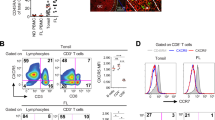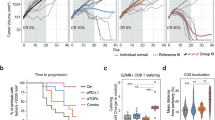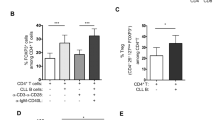Abstract
Transforming growth factor beta (TGF-β) has an important role in mediating T-cell suppression in B-cell non-Hodgkin lymphoma (NHL). However, the underlying mechanism responsible for TGF-β-mediated inhibition of effector memory T (Tm) cells is largely unknown. As reported here, we show that exhaustion is a major mechanism by which TGF-β inhibits Tm cells, and TGF-β mediated exhaustion is associated with upregulation of CD70. We found that TGF-β upregulates CD70 expression on effector Tm cells while it preferentially induces Foxp3 expression in naive T cells. CD70 induction by TGF-β is Smad3-dependent and involves IL-2/Stat5 signaling. CD70+ T cells account for TGF-β-induced exhaustion of effector Tm cells. Both TGF-β-induced and preexisting intratumoral CD70+ effector Tm cells from B-cell NHL have an exhausted phenotype and express higher levels of PD-1 and TIM-3 compared with CD70− T cells. Signaling transduction, proliferation and cytokine production are profoundly decreased in these cells, and they are highly susceptible to apoptosis. Clinically, intratumoral CD70-expressing T cells are prevalent in follicular B-cell lymphoma (FL) biopsy specimens, and increased numbers of intratumoral CD70+ T cells correlate with an inferior patient outcome. These findings confirm TGF-β-mediated effector Tm cell exhaustion as an important mechanism of immune suppression in B-cell NHL.
This is a preview of subscription content, access via your institution
Access options
Subscribe to this journal
Receive 12 print issues and online access
$259.00 per year
only $21.58 per issue
Buy this article
- Purchase on Springer Link
- Instant access to full article PDF
Prices may be subject to local taxes which are calculated during checkout








Similar content being viewed by others
References
Gallimore A, Glithero A, Godkin A, Tissot AC, Pluckthun A, Elliott T et al. Induction and exhaustion of lymphocytic choriomeningitis virus-specific cytotoxic T lymphocytes visualized using soluble tetrameric major histocompatibility complex class I-peptide complexes. J Exp Med 1998; 187: 1383–1393.
Zajac AJ, Blattman JN, Murali-Krishna K, Sourdive DJ, Suresh M, Altman JD et al. Viral immune evasion due to persistence of activated T cells without effector function. J Exp Med 1998; 188: 2205–2213.
Day CL, Kaufmann DE, Kiepiela P, Brown JA, Moodley ES, Reddy S et al. PD-1 expression on HIV-specific T cells is associated with T-cell exhaustion and disease progression. Nature 2006; 443: 350–354.
D'Souza M, Fontenot AP, Mack DG, Lozupone C, Dillon S, Meditz A et al. Programmed death 1 expression on HIV-specific CD4+ T cells is driven by viral replication and associated with T cell dysfunction. J Immunol 2007; 179: 1979–1987.
Ulsenheimer A, Gerlach JT, Gruener NH, Jung MC, Schirren CA, Schraut W et al. Detection of functionally altered hepatitis C virus-specific CD4 T cells in acute and chronic hepatitis C. Hepatology 2003; 37: 1189–1198.
Urbani S, Amadei B, Tola D, Massari M, Schivazappa S, Missale G et al. PD-1 expression in acute hepatitis C virus (HCV) infection is associated with HCV-specific CD8 exhaustion. J Virol 2006; 80: 11398–11403.
Kasprowicz V, Schulze Zur Wiesch J, Kuntzen T, Nolan BE, Longworth S, Berical A et al. High level of PD-1 expression on hepatitis C virus (HCV)-specific CD8+ and CD4+ T cells during acute HCV infection, irrespective of clinical outcome. J Virol 2008; 82: 3154–3160.
Mumprecht S, Schurch C, Schwaller J, Solenthaler M, Ochsenbein AF . Programmed death 1 signaling on chronic myeloid leukemia-specific T cells results in T-cell exhaustion and disease progression. Blood 2009; 114: 1528–1536.
Ahmadzadeh M, Johnson LA, Heemskerk B, Wunderlich JR, Dudley ME, White DE et al. Tumor antigen-specific CD8 T cells infiltrating the tumor express high levels of PD-1 and are functionally impaired. Blood 2009; 114: 1537–1544.
Klein L, Trautman L, Psarras S, Schnell S, Siermann A, Liblau R et al. Visualizing the course of antigen-specific CD8 and CD4 T cell responses to a growing tumor. Eur J Immunol 2003; 33: 806–814.
Fourcade J, Sun Z, Benallaoua M, Guillaume P, Luescher IF, Sander C et al. Upregulation of Tim-3 and PD-1 expression is associated with tumor antigen-specific CD8+ T cell dysfunction in melanoma patients. J Exp Med 2010; 207: 2175–2186.
Sakuishi K, Apetoh L, Sullivan JM, Blazar BR, Kuchroo VK, Anderson AC . Targeting Tim-3 and PD-1 pathways to reverse T cell exhaustion and restore anti-tumor immunity. J Exp Med 2010; 207: 2187–2194.
Yang ZZ, Grote DM, Ziesmer SC, Niki T, Hirashima M, Novak AJ et al. IL-12 upregulates TIM-3 expression and induces T cell exhaustion in patients with follicular B cell non-Hodgkin lymphoma. J Clin Invest 2012; 122: 1271–1282.
Tesselaar K, Xiao Y, Arens R, van Schijndel GM, Schuurhuis DH, Mebius RE et al. Expression of the murine CD27 ligand CD70 in vitro and in vivo. J Immunol 2003; 170: 33–40.
van Gisbergen KP, van Olffen RW, van Beek J, van der Sluijs KF, Arens R, Nolte MA et al. Protective CD8 T cell memory is impaired during chronic CD70-driven costimulation. J Immunol 2009; 182: 5352–5362.
Oelke K, Lu Q, Richardson D, Wu A, Deng C, Hanash S et al. Overexpression of CD70 and overstimulation of IgG synthesis by lupus T cells and T cells treated with DNA methylation inhibitors. Arthritis Rheum 2004; 50: 1850–1860.
Han BK, White AM, Dao KH, Karp DR, Wakeland EK, Davis LS . Increased prevalence of activated CD70+CD4+ T cells in the periphery of patients with systemic lupus erythematosus. Lupus 2005; 14: 598–606.
Lee WW, Yang ZZ, Li G, Weyand CM, Goronzy JJ . Unchecked CD70 expression on T cells lowers threshold for T cell activation in rheumatoid arthritis. J Immunol 2007; 179: 2609–2615.
Nolte MA, van Olffen RW, van Gisbergen KP, van Lier RA . Timing and tuning of CD27-CD70 interactions: the impact of signal strength in setting the balance between adaptive responses and immunopathology. Immunol Rev 2009; 229: 216–231.
Lu Q, Wu A, Richardson BC . Demethylation of the same promoter sequence increases CD70 expression in lupus T cells and T cells treated with lupus-inducing drugs. J Immunol 2005; 174: 6212–6219.
Jiang H, Xiao R, Lian X, Kanekura T, Luo Y, Yin Y et al. Demethylation of TNFSF7 contributes to CD70 overexpression in CD4+ T cells from patients with systemic sclerosis. Clin Immunol 2012; 143: 39–44.
Marie JC, Liggitt D, Rudensky AY . Cellular mechanisms of fatal early-onset autoimmunity in mice with the T cell-specific targeting of transforming growth factor-beta receptor. Immunity 2006; 25: 441–454.
Li MO, Sanjabi S, Flavell RA . Transforming growth factor-beta controls development, homeostasis, and tolerance of T cells by regulatory T cell-dependent and -independent mechanisms. Immunity 2006; 25: 455–471.
Yang ZZ, Grote DM, Ziesmer SC, Xiu B, Yates NR, Secreto FJ et al. Soluble and membrane-bound TGF-beta-mediated regulation of intratumoral T cell differentiation and function in B-cell non-Hodgkin lymphoma. PloS One 2013; 8: e59456.
Tinoco R, Alcalde V, Yang Y, Sauer K, Zuniga EI . Cell-intrinsic transforming growth factor-beta signaling mediates virus-specific CD8+ T cell deletion and viral persistence in vivo. Immunity 2009; 31: 145–157.
Rubtsov YP, Rudensky AY . TGFbeta signalling in control of T-cell-mediated self-reactivity. Nat Rev Immunol 2007; 7: 443–453.
Kehrl JH, Wakefield LM, Roberts AB, Jakowlew S, Alvarez-Mon M, Derynck R et al. Production of transforming growth factor beta by human T lymphocytes and its potential role in the regulation of T cell growth. J Exp Med 1986; 163: 1037–1050.
Yang ZZ, Novak AJ, Ziesmer SC, Witzig TE, Ansell SM . Malignant B cells skew the balance of regulatory T cells and TH17 cells in B-cell non-Hodgkin's lymphoma. Cancer Res 2009; 69: 5522–5530.
Han SH, Yea SS, Jeon YJ, Yang KH, Kaminski NE . Transforming growth factor-beta 1 (TGF-beta1) promotes IL-2 mRNA expression through the up-regulation of NF-kappaB, AP-1 and NF-AT in EL4 cells. J Pharmacol Exp Ther 1998; 287: 1105–1112.
McKarns SC, Kaminski NE . TGF-beta 1 differentially regulates IL-2 expression and [3H]-thymidine incorporation in CD3 epsilon mAb- and CD28 mAb-activated splenocytes and thymocytes. Immunopharmacology 2000; 48: 101–115.
Yao Z, Kanno Y, Kerenyi M, Stephens G, Durant L, Watford WT et al. Nonredundant roles for Stat5a/b in directly regulating Foxp3. Blood 2007; 109: 4368–4375.
Glass G, Papin JA, Mandell JW . SIMPLE: a sequential immunoperoxidase labeling and erasing method. J Histochem Cytochem 2009; 57: 899–905.
Huang J, Kerstann KW, Ahmadzadeh M, Li YF, El-Gamil M, Rosenberg SA et al. Modulation by IL-2 of CD70 and CD27 expression on CD8+ T cells: importance for the therapeutic effectiveness of cell transfer immunotherapy. J Immunol 2006; 176: 7726–7735.
Sung JL, Lin JT, Gorham JD . CD28 co-stimulation regulates the effect of transforming growth factor-beta1 on the proliferation of naive CD4+ T cells. Int Immunopharmacol 2003; 3: 233–245.
Gunnlaugsdottir B, Maggadottir SM, Ludviksson BR . Anti-CD28-induced co-stimulation and TCR avidity regulates the differential effect of TGF-beta1 on CD4+ and CD8+ naive human T-cells. Int Immunol 2005; 17: 35–44.
Tesselaar K, Arens R, van Schijndel GM, Baars PA, van der Valk MA, Borst J et al. Lethal T cell immunodeficiency induced by chronic costimulation via CD27-CD70 interactions. Nat Immunol 2003; 4: 49–54.
Penaloza-MacMaster P, Ur Rasheed A, Iyer SS, Yagita H, Blazar BR, Ahmed R . Opposing effects of CD70 costimulation during acute and chronic lymphocytic choriomeningitis virus infection of mice. J Virol 2011; 85: 6168–6174.
Arens R, Schepers K, Nolte MA, van Oosterwijk MF, van Lier RA, Schumacher TN et al. Tumor rejection induced by CD70-mediated quantitative and qualitative effects on effector CD8+ T cell formation. J Exp Med 2004; 199: 1595–1605.
Glouchkova L, Ackermann B, Zibert A, Meisel R, Siepermann M, Janka-Schaub GE et al. The CD70/CD27 pathway is critical for stimulation of an effective cytotoxic T cell response against B cell precursor acute lymphoblastic leukemia. J Immunol 2009; 182: 718–725.
Couderc B, Zitvogel L, Douin-Echinard V, Djennane L, Tahara H, Favre G et al. Enhancement of antitumor immunity by expression of CD70 (CD27 ligand) or CD154 (CD40 ligand) costimulatory molecules in tumor cells. Cancer Gene Ther 1998; 5: 163–175.
Lorenz MG, Kantor JA, Schlom J, Hodge JW . Anti-tumor immunity elicited by a recombinant vaccinia virus expressing CD70 (CD27L). Hum Gene Ther 1999; 10: 1095–1103.
Douin-Echinard V, Bornes S, Rochaix P, Tilkin AF, Peron JM, Bonnet J et al. The expression of CD70 and CD80 by gene-modified tumor cells induces an antitumor response depending on the MHC status. Cancer Gene Ther 2000; 7: 1543–1556.
Kelly JM, Darcy PK, Markby JL, Godfrey DI, Takeda K, Yagita H et al. Induction of tumor-specific T cell memory by NK cell-mediated tumor rejection. Nat Immunol 2002; 3: 83–90.
Cormary C, Gonzalez R, Faye JC, Favre G, Tilkin-Mariame AF . Induction of T-cell antitumor immunity and protection against tumor growth by secretion of soluble human CD70 molecules. Cancer Gene Ther 2004; 11: 497–507.
Rowley TF, Al-Shamkhani A . Stimulation by soluble CD70 promotes strong primary and secondary CD8+ cytotoxic T cell responses in vivo. J Immunol 2004; 172: 6039–6046.
Miller J, Eisele G, Tabatabai G, Aulwurm S, von Kurthy G, Stitz L et al. Soluble CD70: a novel immunotherapeutic agent for experimental glioblastoma. J Neurosurg 2010; 113: 280–285.
Hishima T, Fukayama M, Hayashi Y, Fujii T, Ooba T, Funata N et al. CD70 expression in thymic carcinoma. Am J Surg Pathol 2000; 24: 742–746.
Wischhusen J, Jung G, Radovanovic I, Beier C, Steinbach JP, Rimner A et al. Identification of CD70-mediated apoptosis of immune effector cells as a novel immune escape pathway of human glioblastoma. Cancer Res 2002; 62: 2592–2599.
French RR, Taraban VY, Crowther GR, Rowley TF, Gray JC, Johnson PW et al. Eradication of lymphoma by CD8 T cells following anti-CD40 monoclonal antibody therapy is critically dependent on CD27 costimulation. Blood 2007; 109: 4810–4815.
Yang ZZ, Novak AJ, Ziesmer SC, Witzig TE, Ansell SM . CD70+ non-Hodgkin lymphoma B cells induce Foxp3 expression and regulatory function in intratumoral CD4+CD25 T cells. Blood 2007; 110: 2537–2544.
Claus C, Riether C, Schurch C, Matter MS, Hilmenyuk T, Ochsenbein AF . CD27 signaling increases the frequency of regulatory T cells and promotes tumor growth. Cancer Res 2012; 72: 3664–3676.
Chahlavi A, Rayman P, Richmond AL, Biswas K, Zhang R, Vogelbaum M et al. Glioblastomas induce T-lymphocyte death by two distinct pathways involving gangliosides and CD70. Cancer Res 2005; 65: 5428–5438.
Diegmann J, Junker K, Gerstmayer B, Bosio A, Hindermann W, Rosenhahn J et al. Identification of CD70 as a diagnostic biomarker for clear cell renal cell carcinoma by gene expression profiling, real-time RT-PCR and immunohistochemistry. Eur J Cancer 2005; 41: 1794–1801.
De Colvenaer V, Taveirne S, Hamann J, de Bruin AM, De Smedt M, Taghon T et al. Continuous CD27 triggering in vivo strongly reduces NK cell numbers. Eur J Immunol 2010; 40: 1107–1117.
Bertrand P, Maingonnat C, Penther D, Guney S, Ruminy P, Picquenot JM et al. The costimulatory molecule CD70 is regulated by distinct molecular mechanisms and is associated with overall survival in diffuse large B-cell lymphoma. Genes Chromosomes Cancer 2013; 52: 764–774.
Acknowledgements
This work was supported in part by grants from the National Institutes of Health (P50 CA97274), the Lymphoma Research Foundation, the Leukemia and Lymphoma Society and the Predolin Foundation.
Author information
Authors and Affiliations
Corresponding authors
Ethics declarations
Competing interests
The authors declare no conflict of interest.
Additional information
Supplementary Information accompanies this paper on the Leukemia website
Supplementary information
Rights and permissions
About this article
Cite this article
Yang, ZZ., Grote, D., Xiu, B. et al. TGF-β upregulates CD70 expression and induces exhaustion of effector memory T cells in B-cell non-Hodgkin’s lymphoma. Leukemia 28, 1872–1884 (2014). https://doi.org/10.1038/leu.2014.84
Received:
Revised:
Accepted:
Published:
Issue Date:
DOI: https://doi.org/10.1038/leu.2014.84
This article is cited by
-
Characterization of immune exhaustion and suppression in the tumor microenvironment of splenic marginal zone lymphoma
Leukemia (2023)
-
Expression of soluble CD27 in extranodal natural killer/T-cell lymphoma, nasal type: potential as a biomarker for diagnosis and CD27/CD70-targeted therapy
Cancer Immunology, Immunotherapy (2023)
-
Exhaustion of CAR T cells: potential causes and solutions
Journal of Translational Medicine (2022)
-
The CD70-CD27 axis in oncology: the new kids on the block
Journal of Experimental & Clinical Cancer Research (2022)
-
Two subsets of stem-like CD8+ memory T cell progenitors with distinct fate commitments in humans
Nature Immunology (2020)



